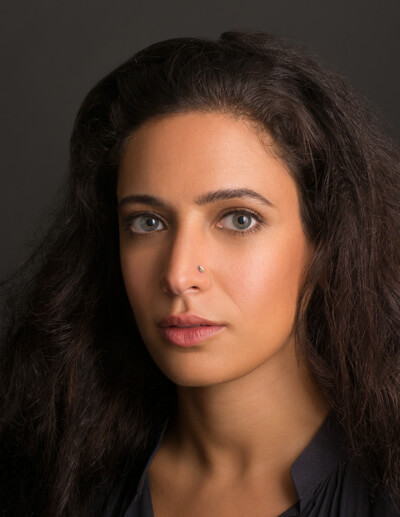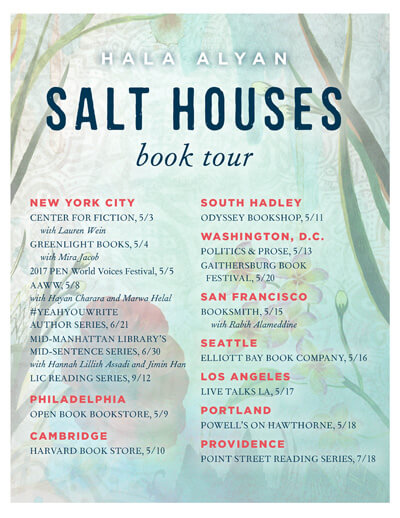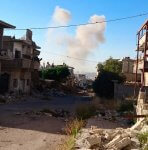Salt Houses, new book on Palestinian experience
Hala Alyan has written a phenomenal book that shares the experiences of a Palestinian family from Nablus, told from multiple perspectives as the family is scattered throughout the Middle East and the West.
SALT HOUSES (Houghton Mifflin Harcourt, May 2, 2017) is the dazzling debut novel by Hala Alyan. It’s a story you haven’t heard before, the one behind the headlines, an epic, multi-generational story about a Palestinian family. It’s a tale of scattered roots, lost home, lost language, and the quest for identity.
Told from multiple perspectives, it begins on the eve of the Six-Day War in 1967, uprooting a family from Nablus and scattering them across the world: to Kuwait City, to Beirut, Paris, Boston, and beyond.
Alyan introduces us to free-spirited Alia, her brother Mustafa who gets sucked into a politically militarized world he can’t escape, and his sweet best friend Atef, who becomes Alia’s husband. Alia and Atef move to Kuwait, where they build a life with their three children. Saddam Hussein’s 1990 invasion disperses the family all over the globe, and the children begin their own families, once again navigating the complexity of assimilation in foreign cities. They grapple with heritage and belonging, as they forge their place in the diaspora.
“I wanted to write something that avoided the usual portrayal of Palestinians and Arabs, which often involves politicizing or exotifying them,” says Alyan. Indeed, her novel humanizes the consequences of an age-old conflict. It gives us the opportunity to see the world through someone else’s eyes, and emerge deepened, changed and with the clear recognition that our similarities are greater than our differences.

HALA ALYAN was born in 1986. She’s an award-winning Palestinian-American poet and a clinical psychologist, and she brings all of that sensitivity and insight to her prose. She has lived all over the Arab world—Kuwait, Tripoli, Amman, Abu Dhabi—and speaks fluent Arabic. Hala is a magnetic presence (you can see her effervescent TEDx at www.halaalyan.com) and she is available for interviews. She lives in New York City, and will tour to Philadelphia, Washington DC, Boston, Los Angeles, San Francisco, Seattle, and Portland.
Salt Houses, A Novel By: Hala Alyan
Publication Date: May 2, 2017
Price: $26.00
Pages: 320
ISBN: 978-0-544-91258-8
A conversation with Hala Alyan
How did the idea for SALT HOUSES come about?
It started out as a short story about a young man in pre-1967 Palestine, but the more I wrote, the more I became intrigued by the character’s sister and mother. I found myself wondering what came before and after this man. There was no specific moment where I decided I’d write a novel; rather, I just followed my curiosity about this family, and it turned into a multigenerational narrative of a single Palestinian family over six decades. More generally, I wanted to write something that avoided the usual (media and art) portrayal of Palestinians and Arabs, which often involves politicizing or exotifying them.
What was the process of writing the book like?
I began working on the novel when I was nearly done with my doctoral dissertation. My topic involved exploring the experiences of Arab immigrant and Arab American survivors of sexual violence which, as you can imagine, got heavy after a while. So I decided I wanted to start working on something else, like a writing palate cleanser.
Up until that point, I’d only written poetry and short stories. I’m very much someone who appreciates instant gratification and poetry appeals to that part of me: I work on a piece then—voilà—I have a poem to show for it. So I needed to find a way to motivate myself to work on a longer project. I finally came up a system that worked: if I did several hours of work on my dissertation, I “earned” myself half an hour of fiction writing.
In that way, writing became the dessert!
How has being a clinical psychologist impacted your identity as a writer?
Two words: character development! Being a psychologist has encouraged me to ask questions about characters’ desires, motivation, etc. I think both identities—writer and psychologist—involve a certain amount of witnessing and paying attention. Also, many of my patients are immigrants or children of immigrants, and I’m fascinated with the intergenerational trauma often associated with displacement. Since most of my days are spent discussing issues of intersecting identities (i.e. an individual being Muslim and queer), with all their complexities, I find myself drawn to those topics in my writing.
In what ways does the narrative mirror your own family’s history?
There are definitely similarities in terms of the geographical “arc,” since my parents met and married in Kuwait City then, after Saddam’s invasion, found themselves seeking refuge in the United States, while their siblings and other family members wound in places as far-flung as Amman, Kansas and Beirut. Beyond that, I took certain elements of various family members’ archetypes (i.e. the strong matriarch, the Americanized grandchildren), but stayed away from emulating anyone too closely, since my family would never let me hear the end of it!
What was it like to write from the perspective of characters as young as eleven and as old as seventy-five?
I loved it. Like many people, I remember my preteen years (too) vividly and I felt a certain catharsis in delving back into that world of self-doubt, fickle adults, and painfully elaborate crushes. One of the chapters takes place during the 2007 war in southern Beirut and I debated for a long time how to portray it, ultimately choosing to keep the focus on the youngest character. I was a college sophomore in Lebanon during that war, and I remember wondering how my younger sister and cousins were absorbing the news reports, distant sounds of bombing and frenzied adults around them.
As for the other end of the spectrum, I spent a lot of time around my grandparents growing up and have always loved listening to them, stories of how the world had changed in front of their eyes. It was always startling to hear my grandparents reference something I’d learned about in history class. Writing this book, I became really fascinated with the idea of what we inherit (emotionally, psychologically, etc.), as well as conceptualizing the same historical event from the perspective of different generations.
What was your favorite part of writing the novel?
Honesty, I fell in love with the Yacoub family, their quirks and burdens and joys, with the sheer humanness of their pursuit of belonging. My favorite characters tend to be the ones that misbehave, and it was so liberating to abandon the “good immigrant” trope and create a story about Palestinians that tries to transcend and honor history at the same time.
Least favorite?
Editing was a nightmare. For a long time, I pretended I wasn’t writing a novel (the idea was too intimidating) and so I wrote chaotically, with zero regard for things like chronological order. I’d write bits and pieces of one section, then travel thirty years in the future to work on some dialogue, then zip back to the 1970s to describe a character’s outfit. Unsurprisingly, when it came time to stitch the fragments into one coherent narrative, I cursed myself on a pretty regular basis.
How have immigrant stories influenced you?
I grew up reading Amy Tan, Chitra Divakaruni, Jhumpa Lahiri, brilliant storytellers who normalized much of what I witnessed as the child of Palestinian and Syrian immigrants, moving from Kuwait to Texas and Oklahoma, from Beirut to Brooklyn— intergenerational clashes over culture; an enduring sense of homesickness; the idea of misplacing and recreating “home” in foreign cities. More than anything, that’s what I’m most excited about—the idea of contributing to that canon of immigration literature. To paraphrase what my father recently told me, one of the implications of a post-Trump America is that these stories will become more urgent and necessary than ever before.
Accolades:
Salt Houses is a May 2017 Indie Next Pick
Salt Houses is a Publishers Marketplace Buzz Book: Spring/Summer 2017
One of The Millions “Most Anticipated” of 2017
One of BookRiot’s “Anticipated Books of 2017”
One of Bustle’s “15 New Authors You’re Going To Be Obsessed With This Year”
One of BookPage’s “10 Women to Watch”
“This timely historical does for the Palestinians what Khaled Hosseini did for the people of Afghanistan. By placing readers inside the hearts and minds of one Arab family scattered from Paris to Boston to Lebanon, [Alyan] beautifully illustrates the resilience of the human spirit.”
—Library Journal
“[An] impressive first novel…the Yacoubs’ distinctly personal experiences will mirror the experiences of immigrants and refugees around the world and the Palestinians’ dislocation in particular….this journey is well worth taking for its unexpected, deeply moving look inside the Palestinian diaspora.”
—Kirkus Reviews, STARRED
“The war may have only lasted six days, but its impact echoes through generations of a Palestinian family in this ambitious debut novel…This is a moving story about a family’s battle to salvage what remains when their home is taken away.”
—Booklist



- Israelisnipers shooting and killing hospital workers in Gaza - December 11, 2023
- CAIR Condemns Israeli Executions of Wounded, Unarmed Palestinian in West Bank - December 11, 2023
- Arab and Muslim American voters face a “simple choice” between Biden’s inhumanity and Trump’s edgy politics - December 9, 2023
























